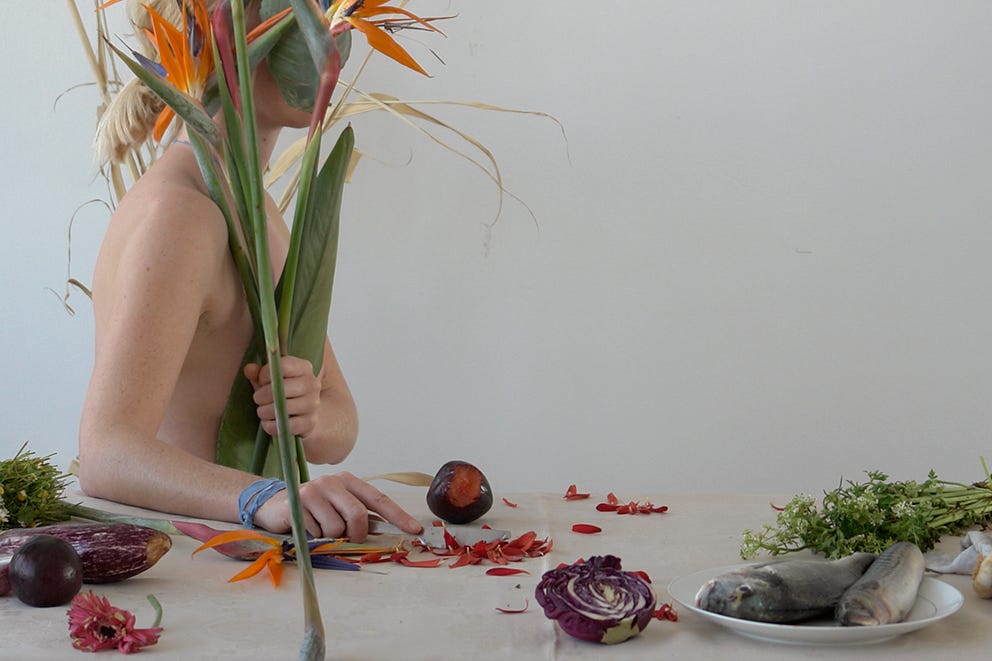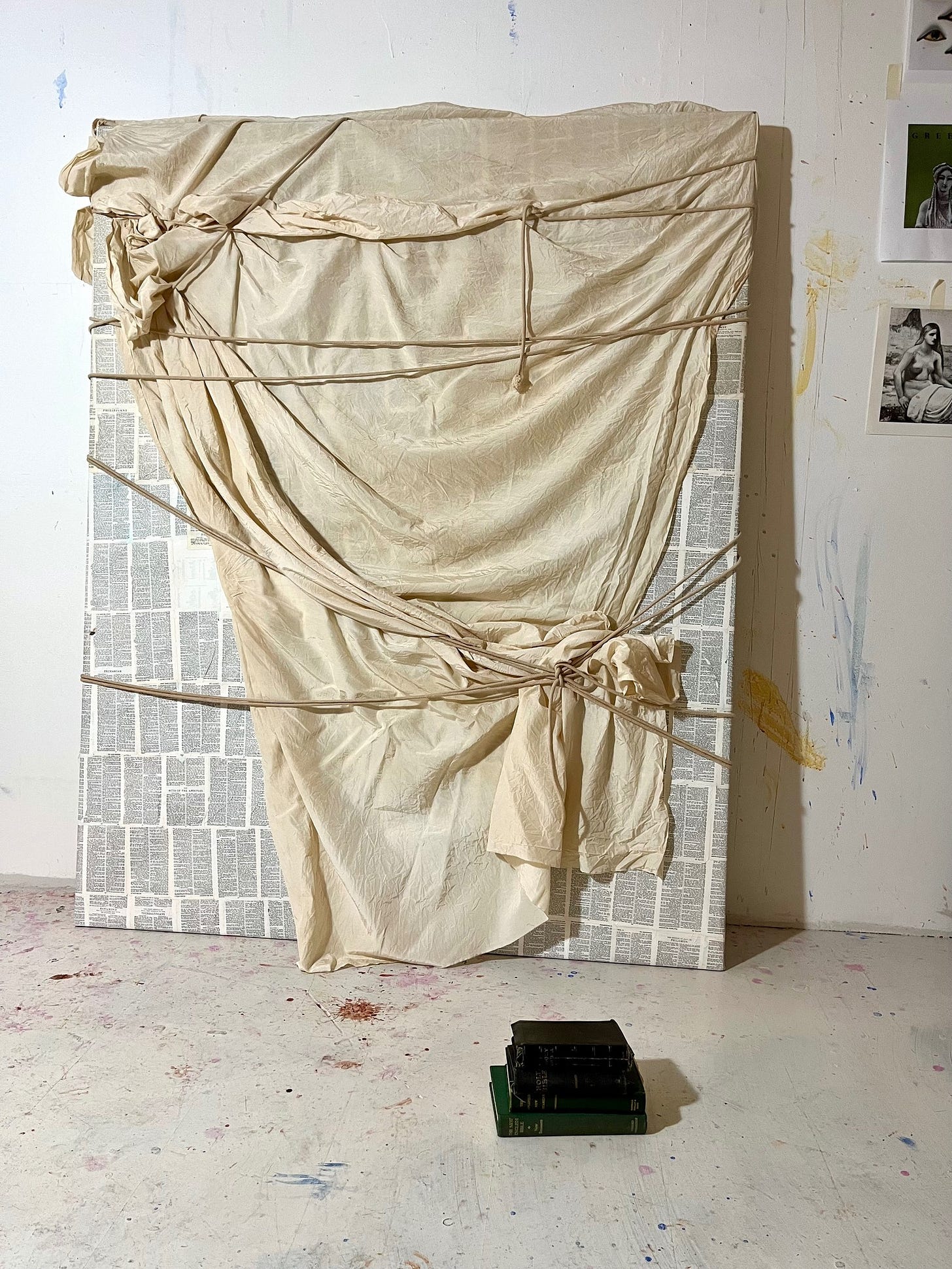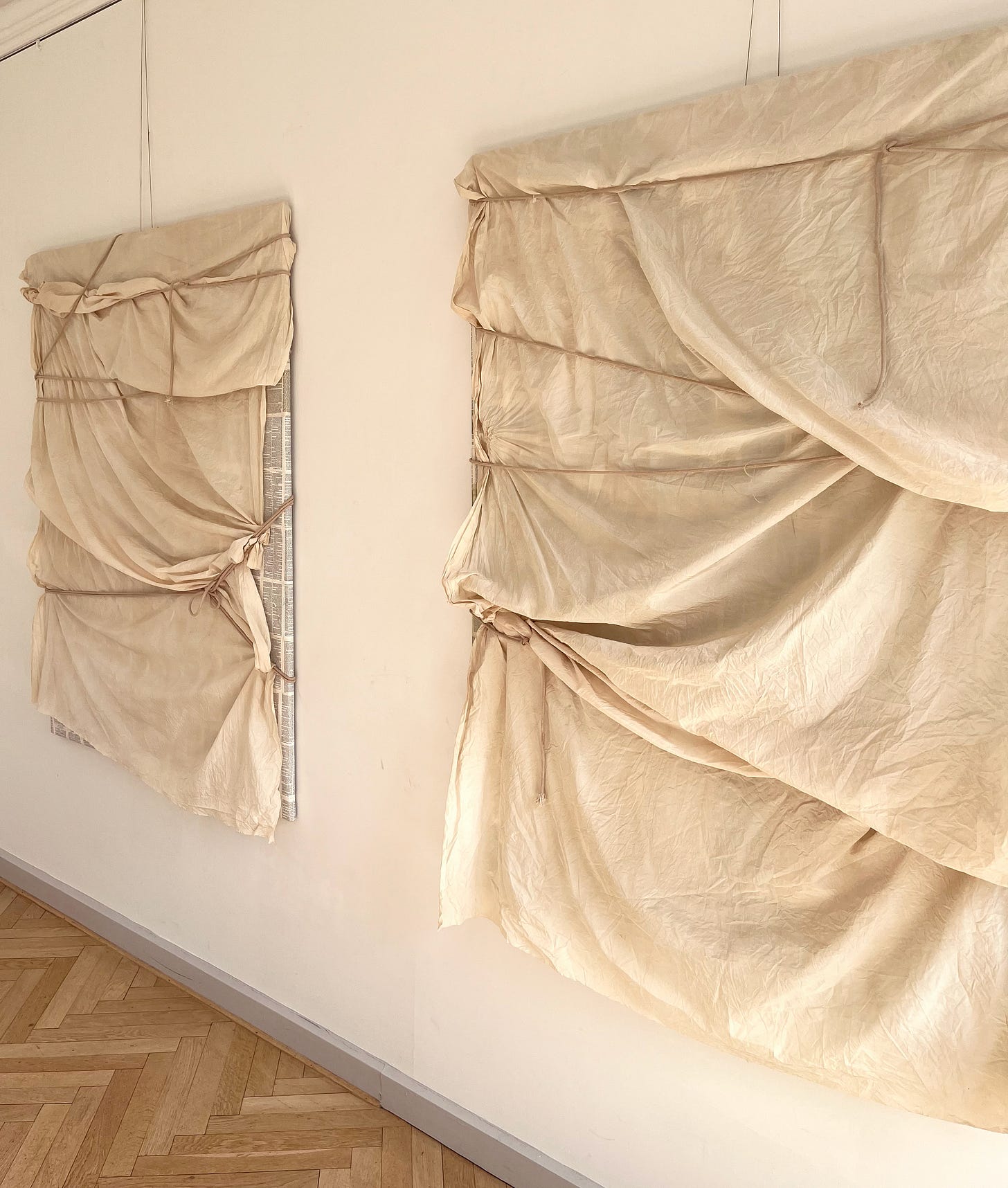Visual artist has doubts after works made of vaginal secretions and pages from the Bible. No system of advice or pre-censorship exists to help me check the legality or illegality of the work.
Article by Augusta Atla. 22 June 2024. Berlingske
Article by Augusta Atla. 22 June 2024. Berlingske
“In fact, Denmark’s new blasphemy law indicates that once again we are living in a religious age.”

Under Denmark’s new anti-blasphemy law I have no idea where I stand as an artist. Since 2011, certain of my works have featured ripped-up Orthodox and Catholic Bibles; another a Bible immersed in water and dye.
These works served as both protest and prevention to ensure that we would not regress and legitimise the power of religions and their view of women. I have no idea whether I am still allowed to exhibit these works in Denmark. When do I need to be afraid of breaking the law, when making free use of religious texts in my work? Tate Modern has acquired works by such artists as John Latham, who chopped up Bibles.
Even as a teenager I knew I was an artist: I had an unruly mind and harnassed to the chariot of Dionysus – poetry, expressionism, ecstasy and melancholy. Only art could stabilise me and transform the destruction of life and history into something marvelous.
Pilgrimage in search of freedom and sense of self
In 1999, my art and I embarked on a feminist pilgrimage in an endeavour to break with the male gaze, and liberate myself from the myriad of inappropriate stigmatisations and taboos that exist: to take a fresh look at sexuality as a continuous expansion of the image of women and to arrive at a freer sense of self than the one I had inherited.
It will take women 2000 years to describe their inner life and sexuality to such an extent that we will be on a par with men. Even as a teenager, I was glued to the writings of Anaïs Nin and the art of Marlene Dumas, both of who tackled their own understanding of sexuality in a new way.
As a young woman, in an era and a society that either makes sex shameful or oversexualises everything in the perpetual wheel of capitalism, I was in a state of confusion: torn between the endless lechery of capitalism, the state-authorised notion of the heterosexual, monogamous couple, and Protestant culture’s denigration of polyamory.
I believe that being a real feminist entails an analysis of what makes up one’s sexuality and, as far as possible, a removal of external influences. Only through art could I liberate myself from all the shame, puritanism, injustice and fetishism rampant in the religions, states and cultures of our world.
I knew we still had a long way to go in this whole evolution of what we might call the more psychological element of gender equality. But then in December 2023, Denmark introduced a new anti-blasphemy law, and I realised that a single law meant regressing 100 years. Not because we did not have such a law before, but we phased it out in 2017, because we never used it.
The Internet enabled Islamists to keep up with what we were doing in Scandinavia. What is sad is not just the threats of Islam and its totally unreasonable demands in a country that has never had a Muslim majority. It is the fact that we are still far from finished in terms of challenging our own Western religions and the way they repress women and hamper feminism. One extremely important element of feminism is a woman’s right to self-determination over her own body. Globally, the battle for that self-determination is far from being won.
As the Danish Family Planning Association (DFPA) puts it: “For at least a decade, conservative religious groups have pumped DKK 4.4 billion into the anti-rights movement in Europe – one of whose goals is the denial of access to free abortion. According to the 2021 report ‘Tip of the Iceberg’, much of that money comes from American billionaires, Russian oligarchs and religious groups.”
Under the new law, not only are we being set back a century and yielding to threats from countries in a completely different continent; we are also endorsing the conviction of religions and sects that their religious texts are sacred. In this context, it is not about physically ripping up a Bible, but about how legally protecting religious texts not only helps to legitimise the abuse of power and violence, but also casts doubt on the right to free abortion.
From September to December 2023, in the run-up to, and debate on the law, I fought hell-bent in the endeavour to fend it off before it was adopted. Throughout the debate, I was in a state of shock at having to discuss yet again something as fundamental as secularism and artistic freedom. As if we were being transported back to 1944, when there was neither artistic freedom nor human rights.
Feel free to report me
In January 2024, when the anti-blasphemy law was passed in Denmark, I was totally done in. I sat in my studio, not comprehending that this was the new reality. A religious text was sacred. What did that mean? I simply did not know.
I sat down and made a work that complied with the law to a T. It is legal to treat a religious text inappropriately “if it is a minor part of the work.” I ripped out all the pages from my late mother’s Bible and glued them one by one on a 120x150-cm canvas. I poured water, saliva, vaginal secretions and moss-green pigment on it and let it run down the work. I soaked some silk and old rope overnight on my patio. The following day, I wound the silk and rope around the work, and there she was: my white bride. She, whom no one must see, covered like a nun or a Muslim woman.
I spoke to two museum directors and a kunsthalle director, and it was obvious that they were scared of exhibiting it, despite the fact that my goal had been to create a legal work. The work was the law incarnate.
No system of advice or pre-censorship exists – or somewhere to send the work to check whether it is legal or illegal.
Some months later, I decided to take the work to an event about artistic freedom of expression. I presented it to the audience and said: “Feel free to report me to the police. I have no idea whether it’s illegal. Let’s find out.” This performance element was an integral part of the work: putting the audience in a situation where they understood that the artist themself had doubts about “where the law stands”, and that they could report me to the police. I wanted the audience to share my sense of the consequences and uncertainty of the law. A member of the audience, whom I did not know, did report me.
Christianity is still patriarchal in its practice and in its writings. There are still examples of terrible aspects of this power. Not long ago, in a music video, the late Sinéad O’Connor ripped up a picture of the Pope. She did so because of the sexual abuse of children by the Roman Catholic Church. A new investigation in 2023 revealed that, since 1940, more than 200,000 children in Spain may have been abused. In France, the estimate is that, since 1950, around 216,000 children have been abused.
Christian sects have also committed appalling acts: the Mennonites, for example. Between 2005 and 2009, a colony in Bolivia systematically drugged women and girls, and raped them. The women woke up with blood running down their legs, later not understanding why they were pregnant. They were told they had been visited by demons during the night. Fortunately, the men were convicted. A film about the incident was released in 2019: Women Talking, directed by Sarah Polley, based on the eponymous book by Miriam Toews.
Unfortunately, even though Denmark’s new anti-blasphemy law came about because of threats from Islam, in the West Islam is not the only problem. Religions pose a huge problem for human rights and feminism, and Denmark’s new anti-blasphemy law merely serves to confirm that religious texts are now protected under law, making it harder to criticise religions in tough terms when they commit assault, abuse power and oppress women. In fact, Denmark’s new law indicates that once again we are living in a religious age.
If we are to continue the fight for women’s equality in society, of which I am aware in my own history – from my grandmother to my mother to me – we need to cherish everything that promotes equality. How do we do that? By not regarding religions as sacrosanct. It is a huge step backwards for gender equality. I would even go so far as to say that feminism is our only powerful antidote to the dazzling power of religion.
When it comes to feminism and gender equality, Denmark was a pioneer in the world. Not anymore.

“I believe that being a real feminist entails an analysis of what makes up one’s sexuality and, as far as possible, a removal of external influences. Only through art could I liberate myself from all the shame, puritanism, injustice and fetishism rampant in the religions, states and cultures of our world.”




